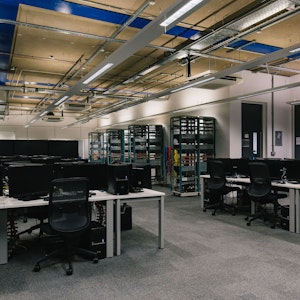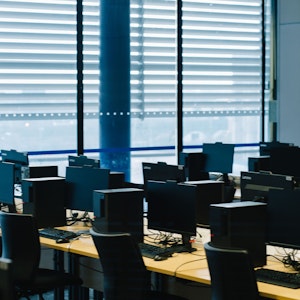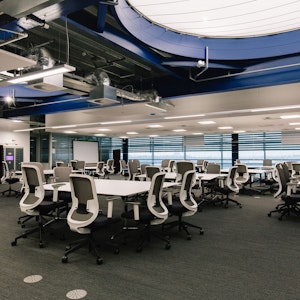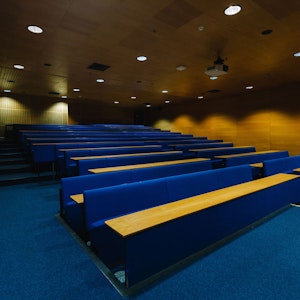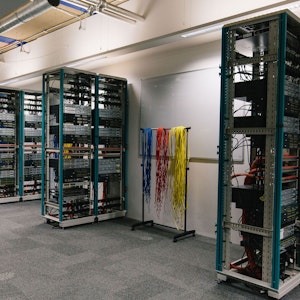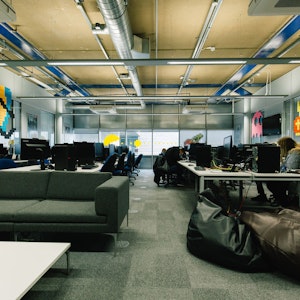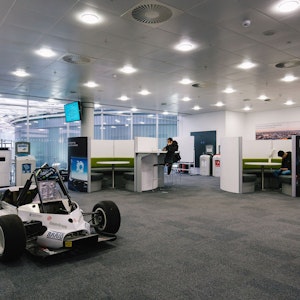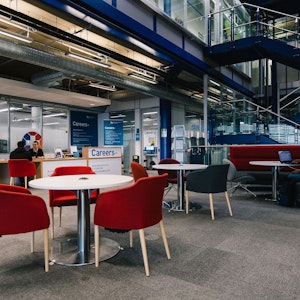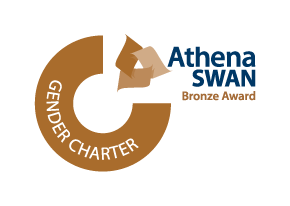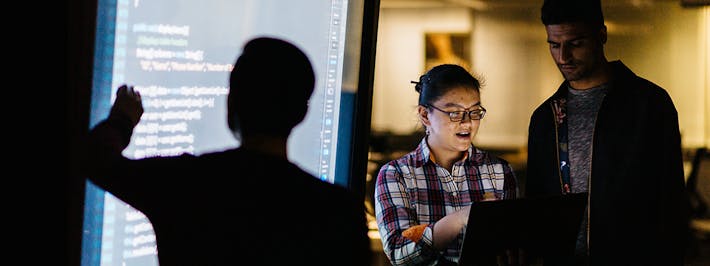
Digital Media Computing with a Foundation Year - BSc (Hons)
Currently viewing course to start in 2024/25 Entry.
Digital Media Computing with a Foundation Year enables you to study with support of the latest in digital media technology equipment. This includes digital TV studios, edit and dubbing suites. We’ve developed this multidisciplinary course to combine computing and digital media....
- Level Foundation
- Study mode Full Time
- Location City Centre
- Award BSc (Hons)
- Start date September 2024
- Fees View course fees
- School School of Computing and Digital Technology
- Faculty Faculty of Computing, Engineering and The Built Environment
This course is:
Open to International Students
Overview
I'm a third year Music Technology student. When I was looking for Music Technology courses, Birmingham City University really stood out to me. I was keen on attending a Bachelor of Science and the course really focussed on the science aspects as well as maintaining the artistic elements of music and sound production. The support of the tutors has been fantastic. The professional standard and the facilities on campus are great due to their accessibility around the clock. The easy access to studios has been extremely helpful in completing my work and keeping on top of deadlines. At BCU, there's been a heavy focus on employability and what I could do with all aspects of my degree. The university has organised the industrial mentor forum, a space where students can communicate with alumni and people within the industry. The Acoustics Special Interest Group also consisted of more bespoke talks from people within the acoustics industry about different aspects of the work and how individual companies run. This is how I developed contact with an acoustic consultancy to complete my placement year. I act as an Acoustic Technician at Dragonfly Consulting. It went so well that I'm returning upon my graduation to continue working with them. The university has given me opportunities I don't think I would have received anywhere else.
I'm a second year computer science student studying at Birmingham City University. As a Computing student, there are plenty of computer labs available. There's entire rooms filled with Cisco networking equipment, as well as laptops that can be rented out to complete your work. Several of the facilities have now moved over to STEAMhouse, which is a £70 million build that is now the new home for Computing and Digital Technology students. One of the main things for me was getting employment at the end of my university degree. And Birmingham City University offers a wealth support for moving into the work environment. The course is a very important focus and a very industry focussed as well. I've been offered roles as a student demonstrator for Python programming. I found that the best way to show that you've understood something is to be able to teach somebody else.
I'm studying Computer Networks and Security. So far, I've really enjoyed my time at BCU. I felt really included within the student community. For the past two years, I've been involved in Innovation Fest. This is an annual event that showcases student work from the faculty. A lot of employers visit this festival, which allows us to widen our professional network. Throughout my time at BCU, I've had some time to
develop a relationship with the Careers+ team and go through tailoring my CV and my cover letters with them. Because of this, I have been presented with many opportunities which they have tailored to me and my needs. Through this, I was encouraged to apply for the women in tech competition.
So it was a one week program and I was working with the team from Cyferd. It's a software company,
and I successfully won and have taken up the placement year with them as a Junior Development Lead.
I look forward to coming back and applying the skills I've learnt throughout my placement and applied them within my studies.
Digital Media Computing with a Foundation Year enables you to study with support of the latest in digital media technology equipment. This includes digital TV studios, edit and dubbing suites.
We’ve developed this multidisciplinary course to combine computing and digital media. This enables you to leave university as a versatile graduate with a mix of computing, technical and content creation skills. Study with us and rest assured that you’ll be prepared for a world seeking those able to develop the next generation of digital media products.
About the Foundation Year
The Foundation Year enables you to study for our BSc (Hons) degree over an extended full-time duration of four years by including a Foundation Certificate (year one of four). The Foundation Certificate provides a broad study programme that underpins the follow-on degree. In order to progress to the next year of your degree, it is necessary to achieve a pass in all of the modules of the Foundation Certificate.

Introducing STEAMhouse
STEAMhouse is a centre for technology, innovation, creative thinking, prototyping and business development. Our brand new £70 million pound building is the new home for the School of Computing and Digital Technology.
What's covered in this course?
Our Digital Media Computing course is an intellectually challenging and highly rewarding programme that covers everything from coding to animation. It will prepare you to meet the professional and technical demands of industry.
You will learn underlying principles of computer science, as well as visual design and human computer interaction, bringing these together through a collaborative innovation project.
Explore more in-depth the areas of web application development, digital media processing, media production and 3D modelling and animation. Plus, take advantage of opportunities to work on real world projects through a major group project in year two, as well as undertaking an individual project in the final year.
You will develop key transferrable skills, such as teamwork, reflection and self-awareness. You’ll also gain analytical skills through coursework tasks, as well as enhancing your problem solving using a range of systems and technologies. There is also an option to undertake an industrial placement, gaining valuable work experience.
Accredited By
This course is accredited by:
This course is a unique blend of media and computing I could not find on any other course. It is challenging yet rewarding and provides me with a sense of accomplishment when assignments are completed. The broad range of the modules allows me to have a wide range of options when choosing my career path.. - Harvir Singh
Why Choose Us?
- Brand new facilities at STEAMhouse - This state-of-the-art building is the new home for our Computing courses. Based at our expanding City Centre Campus, this unique centre will give you access to outstanding facilities and teaching spaces, as well as opportunities to collaborate with people and businesses across multiple sectors and work on real industry-based projects.
- Prepare for industry - Gain computing and multimedia skills to apply the latest technologies, as well as the versatility to succeed in a constantly evolving, challenging industry. Our students have gone on to work with companies such as Big Marketing and Caterpillar
- Highly experienced staff - Our team of academics and practitioners offer not only academic expertise, but also current industry understanding and business acumen
- Excellent campus facilities - Our City Centre Campus houses the largest University TV studio, within a purpose-built Media Centre at The Parkside Building
- A range of study techniques - Network opportunities, multimedia events and guest speakers bring the insights, contacts and the realities of the media world to your studies
- Home to Cisco and Oracle - We are a Cisco ASC (Academy Support Centre) and one of only 10 Cisco Instructor Training Centres (ITC) in the UK
Open Days
Join us for an on-campus Open Day where you'll be able to meet us in person. Booking for the next event isn’t open yet. Register your interest below and we’ll email you as soon as booking goes live.
Next Open Day: 29 June 2024
Entry Requirements
These entry requirements apply for entry in 2024/25.
All required qualifications/grades must have been achieved and evidenced at the earliest opportunity after accepting an offer to help confirm admission and allow for on-time enrolment. This can also include other requirements, like a fee status form and relevant documents. Applicants can track their application and outstanding information requests through their BCU mySRS account.
80 UCAS tariff points
If you have a qualification that is not listed, please contact us.
Fees & How to Apply
UK students
Annual and modular tuition fees shown are applicable to the first year of study. The University reserves the right to increase fees for subsequent years of study in line with increases in inflation (capped at 5%) or to reflect changes in Government funding policies or changes agreed by Parliament. View fees for continuing students.
Award: BSc (Hons)
Starting: Sep 2024
- Mode
- Duration
- Fees
- Full Time
- 4 years
- £9,250 in 2024/25
- Apply via UCAS
International students
Annual and modular tuition fees shown are applicable to the first year of study. The University reserves the right to increase fees for subsequent years of study in line with increases in inflation (capped at 5%) or to reflect changes in Government funding policies or changes agreed by Parliament. View fees for continuing students.
Award: BSc (Hons)
Starting: Sep 2024
- Mode
- Duration
- Fees
- Full Time
- 4 years
- £16,085 in 2024/25
Guidance for UK students
UK students applying for most undergraduate degree courses in the UK will need to apply through UCAS.
The Universities and Colleges Admissions Service (UCAS) is a UK organisation responsible for managing applications to university and college.
Applying through UCAS
- Register with UCAS
- Login to UCAS and complete your details
- Select your course and write a personal statement
- Get a reference
- Pay your application fee and submit your application
Course in Depth
Foundation Year
In order to complete this course a student must successfully complete all the following CORE modules (totalling 120 credits).
The Foundation Mathematics module provides the basic knowledge and mathematical skills which will equip the students to continue their studies to an undergraduate programme.
The module will be focused on mathematics related to the field of computing. The interactive taught sessions will use fundamental mathematical in discussions to broaden understanding of the theory and practice introduced in the module.
This module will provide you with an understanding of the role of digital technologies in transforming industries and sectors. It will provide you with a comprehensive introduction to core concepts of science for digital technology, and an understanding of the fundamental aspects of science essential for studying and working with digital technologies.
You will learn systems thinking methodologies to model systems supported by digital technologies, enabling you to understand different aspects of technology, and to design your own solutions. Moreover, this module will help you to develop essential academic and personal study skills necessary for success in higher education. It will provide you with basic research, academic writing, and reflection skills. These skills are vital for your transition to higher education and will enhance your learning and academic growth.
This module provides the skills necessary to design a web based application around a clear understanding of the business information requirements, a structured design of an interface and the development skills necessary to implement a solution.
This module focuses on varied technologies relating to the design and development of application to meet the information needs of a business. The module will analyse and design an application that meets current web standards.
This module will provide you with an introduction to digital media technology and will allow you to explore technology-driven change in the media industry.
This module will introduce the fundamentals of audio / video capture and editing allowing you to explore workflow practices. You will document your development process, including aspects such as storyboarding and risk assessments and will create an artefact that relates to technology in your chosen degree or industry.
During the journey within higher education, developing your independent study is an essential skill to support shaping the knowledge to become more useful and applied within practice.
This module aims to provide you with necessary skills and tips that should support you to work independently within your discipline and to successfully apply project management tools and techniques to a mini project related to your subject discipline. Within the module, various tutorials, workshops and seminars will encourage the elements or creativity, innovation and thinking. The skills developed from this module acts as a foundation both towards subjects within your discipline, and more importantly, your final year’s project in Level 6.
Foundations of programming aims to provide you with the fundamental principles and practice-based activities needed to begin developing software programs. The module details the anatomy of a structured software program that includes the creation of a program algorithm, a logical, simple and organised program flow and the generation of pseudo and programming code.
The module uses a combination of theory and practice-based sessions designed to engage students in group and individual activities to identify the components of a software program and to apply their knowledge into hands-on software programming activities. During the module sessions you will acquire the basic skills to design and create software programs.
Year One
In order to complete this course a student must successfully complete all the following CORE modules (totalling 120 credits).
This module will introduce you to the basic principles behind programming for example language syntax, structure of a computer programme, development of algorithms and use of object oriented programming. You will use an appropriate professional game engine in order to develop your skills in 2D game development. Through this engine you will learn to use and manipulate a range of media assets, examples include working with sprites, animations, programming computer graphics, incorporating simple physics including collision detection strategies, as well as implementing 2D scenes. The learning and teaching strategy is centred on tutorial sessions where tutors provide advice, guidance and formative evaluation in order to develop your understanding of these core skills.
Within the Computer Systems Module, you will gain knowledge and experience of computers and computer hardware. This module presents a holistic view of how computer systems work and it also provides the underpinning knowledge required:
- for the design of computer architecture
- to show how software interacts with hardware
- to apply electronics principles
- to use number systems for computer technology
This fundamental computer systems module puts into practice the learning done through reading, video lecturers, skills building labs and problem based learning for the acquisition of new knowledge and core practical competencies.
This module provides the underpinning skills necessary to develop an effective web based information system based around a clear understanding of the visual requirements of an interface, a structured design approach and the technical skills necessary to implement a solution.
Data structures and algorithms are essential in computer science, software engineering, and computer games and graphics programming. Data structures are structured representations of data; the design of a data structure determines how operations (such as reading to, writing from, modifying, or computing with the data) can be achieved. An algorithm is a set of instructions which can be followed in order to solve a computational problem.
The module provides the opportunity to learn and critically reflect the skills required in building and designing basic networks and their requirements within a network infrastructure. This module builds on the underpinning knowledge and theory of networking systems.
This first-year project allows you to develop and cultivate a creative mind-set through collaborative innovative practice, allowing you to bring together knowledge and imagination to construct a viable product. It is an opportunity to express your ideas, skills and talent to the wider community of innovative practice.
The project provides you with an opportunity to be part of a thriving community of innovators that practices connected learning. This is facilitated by putting you into inter-disciplinary project teams supported by innovation mentors, advisors and academics; culminating in you exhibiting your work to an international panel of experts.
Year Two
In order to complete this course a student must successfully complete all the following CORE modules (totalling 120 credits).
The vast majority of web applications are connected to databases for the purpose of storing and retrieving information. On this module you will be introduced to relevant concepts and technologies, applying them to the development of such applications.
You will gain knowledge and skills concerning data modelling (entity-relationship models) and relational database implementation and administration (using SQL). You will also acquire new programming skills (e.g., writing server-side scripts in PHP) in order to produce applications that provide useful functionality. You will also gain practical experience in the use of web frameworks to develop web applications to enhance your employability skills.
For graduates wishing to pursue a career in digital media development a comprehensive understanding in the fields of image, video and mixed reality processing is essential.
Many current applications rely on the combination of image and video information, and so an in-depth understanding of the capture, storage, and processing of this information is essential. Furthermore, mixed- and augmented-reality systems are now becoming popular, with applications ranging from entertainment through to engineering being commonplace. This is complemented with the rise in mobile computing and novel sensor systems. Thus, the fundamental concepts in digital image processing, video acquisition and mixed-reality creation underpin many common applications.
You will develop expertise in the capture and manipulation of audio/video data through practical experimentation. A sound understanding of technical concepts will be required in order to deliver realistic solutions to a broad range of real-world problems that you will encounter.
This module forms a core part of the production element of the course, providing the knowledge related to the production of video artefacts, focusing on planning, video production, post production, and video compression.
This module provides knowledge of and develops skills in the production of 3D models, rendering and animation for use in a variety of different media and platforms.
The philosophy of the module is not to either create experts in one particular area of modelling, rendering or animation, or experts in a single tool, but to develop a range of skills and a wider understanding of how to use 3D modelling and animation within digital media.
The module is an opportunity to learn and critically reflect on the skills of collaboration by enabling you to create an interdisciplinary project with students from complementary disciplines, or with academic staff. Collaboration is a vital employability skill within the Creative Industries and this module allows you to develop these skills, making use of University facilities and with the support of academic staff. Within this module framework, several kinds of collaborative opportunities are available. For example, with the approval of your supervisor, you can determine a project based on your own interests; your supervisor may set you a predetermined project to enable you to work with other students in a way that is appropriate to your subject area; or there may be opportunities for you to collaborate with staff on research projects. In all cases, you must apply your subject skills to an interdisciplinary project which will be agreed in advance with your supervisor.
For graduates wishing to pursue a technical career in digital media production, be it Film or visual effects production, then a comprehensive understanding of the low level capture, processing and distribution technology is essential. To complement this a fundamental understanding in the methods for conducting research into the technology, the design and the limitations of this technology is essential.
Professional Placement Year (Optional)
In order to qualify for the award of Bachelor of Science with Honours Digital Media Computing with Foundation Year and Professional Placement Year, a student must successfully complete all of the modules listed as well as the following Level 5 module:
This module is designed to provide you with the opportunity to undertake a credit bearing, 40-week Professional Placement as an integral part of your Undergraduate Degree.
The purpose of the Professional Placement is to improve your employability skills which will, through the placement experience, allow you to evidence your professional skills, attitudes and behaviours at the point of entry to the postgraduate job market. Furthermore, by completing the Professional Placement, you will be able to develop and enhance your understanding of the professional work environment, relevant to your chosen field of study, and reflect critically on your own professional skills development within the workplace.
Final Year
In order to complete this course a student must successfully complete all the following CORE modules (totalling 120 credits).
The purpose of the module is to enable you to undertake a sustained, in-depth and research informed project exploring an area that is of personal interest to you. In agreement with your supervisor, you will decide upon your topic which will take the form of a practical outcome (artefact) with accompanying contextual material. The main consideration when choosing your topic is that it must be aligned to the programme you are studying, and you should consider the relevance of this topic to your future academic or professional development.
At this level, you will be expected to work independently but you will receive additional one-to-one support from your supervisor, who will be familiar with your chosen topic area. As you progress on the module, extra support will be available and this may take the form of group seminars, workshops and online materials that will help to develop your project.
This module provides you with the technical comprehension necessary to organise, manipulate, and enhance video data at both the point of capture and in post-production ready for delivery. You should be able to precisely specify settings and develop workflows based off knowledge in video compression and software requirements, as well as enhance the visual image through grading and compositing.
The module will be practice-led, utilising industry tools and technologies in order to design and deliver productions at a professional quality. The module allows you to further develop skills gained in the Video Production Technology and the 3D Modelling and Animation modules while applying technical knowledge to produce media artefacts.
In this module you will cover topics and technologies related to Cloud Computing. You will explore solutions and learn design principles for building large network-based systems to support both compute and data intensive computing across geographically distributed infrastructure and develop an application using cloud services.
Within this module you will develop productions that span a number of platforms such as film, games, social media, web and VR. It provides you with an opportunity to work with students from a number of disciplines and develop an understanding of how your knowledge and skills can fit into the production workflow of different media industries.
In order to become an effective professional practitioner, one needs to develop industrial awareness including current production and business practices, technologies and pipelines and trends and emergent technologies and how they are shaping industry
Download course specification
Download nowCourse Structure
Lectures are used to introduce themes, theories and concepts, which are further explored in tutorials. Technology-enhanced learning is used, where appropriate, through the provision of online resources, discussion forums and other activities. Textbooks are used, together with professional material and journal articles, in order to ensure that students develop a critical understanding of work in their discipline. The module guides direct students to a full range of resources, including books and journals, as well as specialised course-based material.
Analytical and problem solving skills are further developed using a range of appropriate 'real' and 'theoretical' case studies, plus a range of problem-based learning scenarios. Practical, including lab-based, sessions are used throughout the programme to develop practical skills and to place theory in a work-related context. Where appropriate, you will also use commercial development environments.
You will develop the key skills of research, academic writing and time management required for study at degree level throughout your first two years of study, which will enable you develop them further on the final-year individual project.
Transferable/key skills are pervasive and incorporated into modules and assessments as appropriate. For example, team-working skills are fostered via group activities. You are encouraged to plan your own work schedules and are required to meet deadlines. Reflection and self-awareness are fostered throughout.
A range of assessment methods are employed, assessment criteria being published in each assignment brief. Knowledge and skills are assessed, formatively and summatively by a number of methods, including coursework, examinations (seen and unseen, open and closed-book), presentations, practical assignments, vivas, online forums and project work.
Attendance requirements
For more information on attendance requirements, course contact time and suggested self-study hours, download the course specification.
Why study Digital Media Computing
Our Digital Media Computing course is an intellectually challenging and highly rewarding programme that covers everything from coding to animation. It will prepare you to meet the professional and technical demands of industry..
In the first year you will learn underlying principles of computer science, as well as visual design and human computer interaction, bringing these together through a collaborative innovation project..
During the second and third year of study you will explore more in-depth the areas of web application development, digital media processing, media production and 3D modelling and animation. You will have opportunities to work on real world projects through a major group project in year two, as well as undertaking an individual project in the final year..
You will develop key transferable skills, such as teamwork, reflection and self-awareness. You’ll also gain analytical skills through coursework tasks, as well as enhancing your problem solving using a range of systems and technologies. .
You will have the option to undertake an industrial placement after your second year, gaining valuable work experience, and on the course you'll acquire skills in web technology, programming, animation, 3D modelling, video production, human-computer interaction and interface design to develop web and interactive digital media applications..
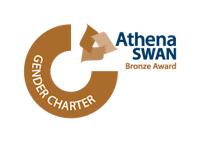
Athena Swan Bronze Award
We have successfully secured the Athena SWAN Departmental Bronze Award recognising a commitment to gender equality.
The Athena Swan Charter is a framework which is used across the globe to support and transform gender equality within higher education (HE) and research.
Employability
Employment Opportunities
The University is committed to preparing you for your future career and giving you a competitive edge in the graduate job market. The University’s Graduate+ programme, an extracurricular awards framework, is designed to augment the subject-based skills that you will have developed throughout the programme with broader transferable skills which will enhance your employability options upon graduation..
Graduate Profiles
 Greg Price
Greg Price
Course : BSc (Hons) Multimedia Technology (renamed as BSc (Hons) Digital Media Computing)
Job Role : Interactive Developer
Company : NERV Interactive Limited
 Leon Barrett
Leon Barrett
Course : BSc (Hons) Multimedia Technology (renamed as BSc (Hons) Digital Media Computing)
Leon must have enjoyed University life - his first job on graduating was right here at the University. And his long-term goal? To get as much industry experience as possible before moving into lecturing in web technology...
Irfan Yasin
Course : BSc (Hons) Multimedia Technology (renamed as BSc (Hons) Digital Media Computing)
Irfan must have impressed his tutors here - because it was one of them who recommended him for his first web development job.
Placements
You'll be encouraged to further enhance your career prospects by including an industrial placement in your course. This takes place after the second year of study and extends the course duration to four years.
As well as providing the workplace experience sought by many employers, a placement provides an invaluable opportunity for you to further develop your practical expertise, earn money and try out a potential career path. Our placements team support you throughout the placement process.
Full details can be found on the School placements page.
International
Birmingham City University is a vibrant and multicultural university in the heart of a modern and diverse city. We welcome many international students every year – there are currently students from more than 80 countries among our student community.
The University is conveniently placed, with Birmingham International Airport nearby and first-rate transport connections to London and the rest of the UK.
Our international pages contain a wealth of information for international students who are considering applying to study here, including:
- Explore some of the good reasons why you should study here.
- Find out how to improve your language skills before starting your studies.
- Find all the information relevant to applicants from your country.
- Learn where to find financial support for your studies.
Facilities & Staff
Our Facilities
We are constantly investing in our estate and are currently in the process of spending £260 million on new learning facilities. This course will be taught at Millennium Point at the City Centre Campus.
The course is supported with a wide range of cutting-edge facilities in the City Centre Campus. We have a state-of-the-art computer games technology lab which contains high-performance PCs, Sony PlayStation development kits and a range of industry standard software including Unity, Unreal and a suite of professional Microsoft development tools.
We also have many open access areas where students can study together and even hire out laptops for use in these spaces and others within the university.
Within the University there are many internationally recognised research teams giving you the opportunity to collaborate with them on exciting interdisciplinary projects.
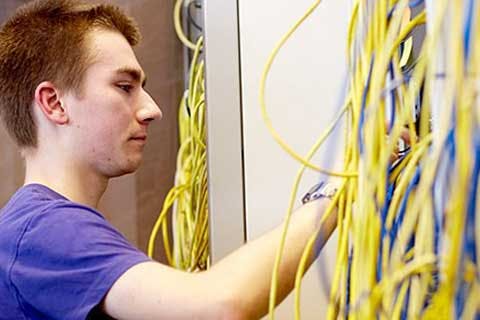
Computer networking
The laboratories are well-equipped for all our computer networking courses, as well as specialist areas for practical work such as voice-over internet protocol (VoIP), forensic and ethical hacking technologies, wireless and mobile technologies and radio frequency identification technologies to name but a few.
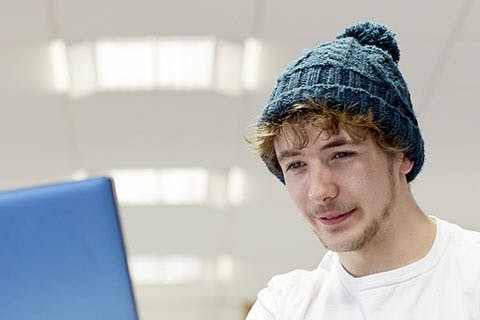
Software development and computer programming
There are a number of open access, software development and computer programming laboratories that can be used to develop systems and programmes, including database management systems such as MySQL, to name but a few.
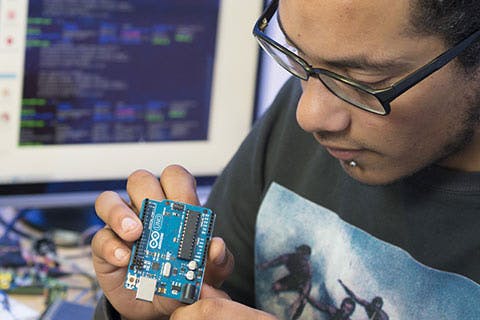
Systems laboratories
Our embedded systems laboratories are used to develop real-time systems, such as specialist hardware training and development resources, and industrial-standard software development and simulation tools. These include microcontroller software and robotics design and development, to name but a few.
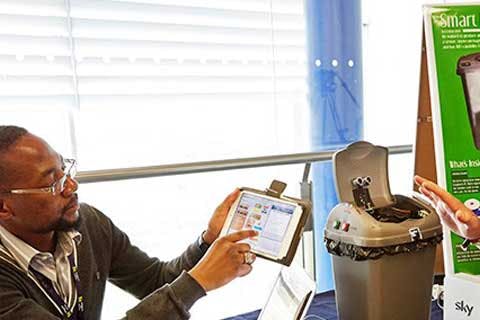
Electronic systems
To underpin the basic principles of electronic systems, we have a well-equipped laboratory of general and specialist test and measurement kits, including powered prototyping development boards, dual power supplies, frequency generators and counters and digital multi-meters to name but a few.
Forensic computing
Our successful development of forensic computing has led to a specialist forensics laboratory that is fully equipped with essential hardware and software for this sensitive area of study. The laboratory includes high-spec PCs with built-in multi interface Tableau write blockers, EnCase and FTK computer forensic software and steganography detection and analysis software, to name but a few.
More on our facilities
Our staff
Dr Martyn Ratcliffe
Senior Lecturer
Martyn graduated with a physics degree and started his career at British Aerospace. After several changes of department and the completion of an M.Sc. in Digital Systems he settled in the software department, designing real-time software for weapon systems.
More about MartynKira Summers
Programme Leader, Lecturer
Akira Summers has been working in software and technological development since the year 2000. Starting off in web development and interactive media, she has held many development roles and spent several years working as an embedded game programmer, multimedia developer and learning technologist.
More about KiraSandeep Singh Chahil
Lecturer
Sandeep has a background in corporate video production, having spent several years producing content for commercial video projects. He’s experienced in all stages of this process, with a strong technical knowledge of hardware and software systems.
More about SandeepDr Roy Priest
Associate Professor of Computing
Roy is Academic Lead in the Centre for Digital Media Technology and Director of Learning, Teaching and Employability within the School of Computing and Digital Technology. Prior to working in higher education, Roy was involved in various aspects of the music industry, as a professional musician and also working in artist management and legal and...
More about Roy